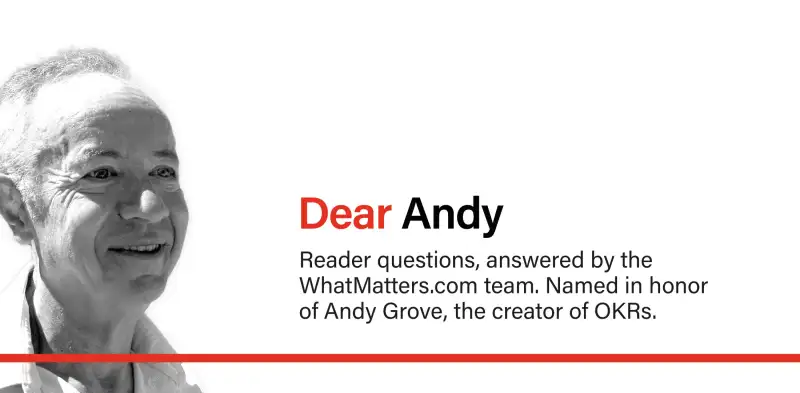Dear Andy,
The team I manage just started using OKRs, and I’m really excited about their potential. However, we recently ran into a snag, and I’m hoping you could help me out. When it came time for people to volunteer to own OKRs… crickets. No one wanted to step up! My question, then, is what happens if no one wants to own an OKR? Should we just assign it? Do you have any advice on getting the team excited about our OKRs to the point where they’d feel comfortable taking ownership? Thanks in advance!
Sincerely,
Alysha

Hi Alysha!
Thanks for writing in and for that great question.
Ooof I feel you, friend. We’ve all been to those “Bueller… Bueller…?”-esque meetings and they are certainly awkward. OKR ownership should happen voluntarily and enthusiastically, so I don’t recommend assigning them out without discussion. Luckily, I have a few ideas as to why your team may not be enthused about the prospect of OKR ownership — and how to remedy it.
Does your team see themselves in these OKRS? OKRs are owned by team members who have the most at stake in their outcome, and, if they’re written properly, it should be fairly obvious who that applies to. If your team doesn’t see themselves in these OKRs, they most likely won’t feel ownership is the job for them. Take some time and clarify which team members you feel will have the greatest stake. If you have someone in mind, it’s okay to “nominate” a team member to own an OKR. Sometimes it may take a little gentle nudging for a team member to realize they’re the right person — just make sure you don’t force it. If they have objections, ask them why or what might help them feel full ownership is for them?
Is your team on board with these OKRs/the OKR process as a whole?
What was your goal-setting process like? Were team members given ample opportunity to contribute thoughts and criticism? On a macro level, do they know why you’re adopting OKRs in the first place? OKRs work best when everyone is excited about them, so a little communication and education about the benefits of OKRs can go a long way.
Do they fully understand what’s being asked of them as an OKR owner? “Ownership” can seem like an intimidating term. Make sure each owner knows that they are not solely responsible for the project’s success or failure. The OKR owner is responsible for getting mutual commitment to what matters, how it will be measured, and who is “driving” momentum for each KR. If an OKR is behind or failing, the owner can “sound the alarm” — but the team shares the responsibility for developing the solutions. I bet you’ll see quite a few more hands raised if they know they aren’t alone during the process.
OKRs can be owned by any member of the team, and that includes management. We strongly encourage you to have only one owner per OKR, even if Key Results are distributed across a team. It doesn’t have to be the most senior person on the team, either. But if you can’t find anyone willing to take the OKR on as is, ownership falls on management’s shoulders. Whether you’re the team lead or less senior, see it as a chance to “lead by example.” Seeing OKR ownership in practice vs. theory will assuage quite a few fears, making team members more eager to step up the next time around.
Thanks for writing in, Alysha and best of luck to you.
Sincerely,
Billy from the What Matters Team

